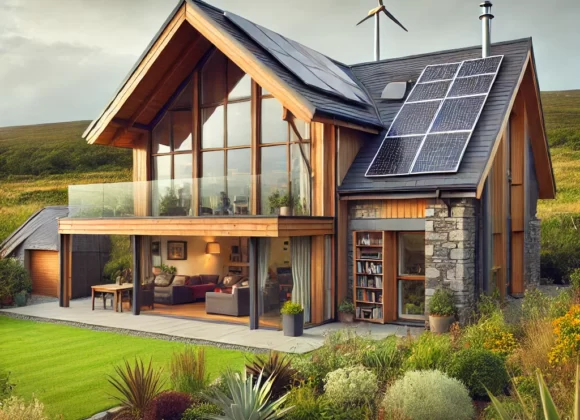How Can Renters Make their Property Warmer and Greener?
Most renters don’t get the opportunity to improve their properties while they’re living there as the landlord is responsible for the design and upkeep of the building. You might not have the ability to make big changes like replacing the heating system or insulating the roof, but there are ways for eco-conscious tenants to make their homes warmer and greener.
Here are some tips to make your rental property more eco-friendly:
Seal cold air drafts
Houses can lose significant amounts of heat through leaks in windows and doors, especially in older properties. Up to 35% of your home’s energy escapes out of your windows.
The good news is, you can easily seal cold air drafts using caulk. This will improve insulation around your windows and help to prevent heat loss. Caulk is affordable and easy to use, but you should watch a tutorial window if you haven’t used it before and check that your landlord is happy for you to do it.
Install secondary glazing
It is not usually possible to install double glazing when you live in a rental property – unless your landlord is prepared to upgrade old windows – but you can still insulate your windows.
According to Nexus, another option may be to fit secondary glazing made from an acrylic sheet that covers the window. This is an easy and affordable way to insulate your existing window without having to replace the entire unit.
Install a programmable thermostat
Installing a programmable thermostat will help you take control of your heating and reduce the amount that you spend on heating bills. A programmable thermostat allows you to manage your heating more effectively and maintain a consistent temperature in your home.
There is a good variety of programmable thermostats available for under £50 and most are easy to install without causing any major or permanent changes to the decor.
Purchase blackout curtains
As mentioned above, older rental properties can lose significant amounts of heat through drafty windows. Installing blackout curtains is another simple way to insulate old windows and prevent heat loss. Make sure that you close your curtains as soon as it gets dark to keep the heat in your room.
Blackout curtains can reduce heat loss by up to 25% according to experts at Innuwindow. Purchasing blackout curtains are a good investment as you can take them with you to your next property and a quality pair will last many years.
Rearrange your furniture
Make sure that you don’t have furniture like a sofa or bed placed in front of a radiator as this will block heat and waste energy. Moving furniture away from radiators will allow the warm air to circulate freely around your room, making your radiators more energy-efficient.
Insulate your loft
Roughly 25% of the heat produced by your boiler will escape through the roof of your home. Having insulation professionally installed is likely to be an unnecessary expense when you are renting, but there are other ways to stop heat from escaping through your roof.
You can purchase rolls of insulation from your local DIY store and use them to insulate your loft. Layer insulation material between the joists or lay it on top of boards if your loft is boarded. This will prevent heat from escaping through your roof and help your home stay warm during winter.
Replace light bulbs with LEDs
Replacing light bulbs is one of the easiest ways to make your rental property more energy-efficient. Switching to LEDs can make a significant difference to your energy bills as they use less electricity and last longer than traditional bulbs.
Check your energy performance certificate
You should check your domestic energy performance certificate (EPC) If you think your energy bills are too high or your home isn’t staying warm during winter. You can check your EPC rating by entering your postcode online.
Properties are given an energy rating between A and G – with A being the most energy-efficient and G being the least. All rental properties in England and Wales must be rated at least E before they can be rented out, so make sure your property complies with this.
The government is currently discussing increasing the minimum standard to band C. This will help make rental properties more eco-friendly and affordable for tenants.
Summary
You have less freedom to carry out home improvements when you live in a rental property. However, there are lots of simple ways to make your home warmer and more eco-friendly. Most landlords allow tenants to complete these simple DIY projects, but make sure you always check with your landlord before you make any changes to your rental property.



